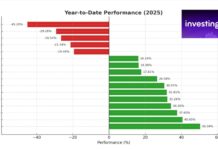The retail CFD (Contract for Differences) market is experiencing remarkable growth, with active accounts nearing the 6 million mark. As of the second quarter of 2025, the total number of global active CFD accounts has reached approximately 5.68 million, according to the latest insights from Finance Magnates. This surge not only highlights the popularity of CFDs among retail traders but also indicates a robust momentum in the financial trading sector. So, what’s driving this increase? Let’s explore the factors contributing to this trend and the latest developments in the industry.
Exploring the Growth of CFD Accounts
The CFD industry has shown substantial progress, particularly during 2025. With a remarkable increase from the previous quarter, the total number of active accounts surpassed the significant threshold of 5 million. Notably, eleven brokers now boast over 100,000 monthly active accounts. This rapid expansion paints a promising picture of the sector’s health and appeal.
Key Players in the CFD Market
Among the leading brokers, XTB remains at the forefront with 750,000 accounts. Other notable players include IG, CMC, and Robinhood, all of whom are making waves in the trading landscape. The competitive nature of the market is evident, and the continuous rise in active accounts suggests a thriving trading community eager to engage with CFDs.
Regulatory Developments Fueling Growth
One of the driving forces behind the increase in CFD accounts is the rise in regulatory approvals across the brokerage landscape. For instance, XM recently secured a Category 5 license from Dubai’s Securities and Commodities Authority. This license allows XM to operate locally, marking a significant step in their expansion strategy.
Additionally, XM has established a regional base in Dubai, aiming to activate its new license before the year concludes. Such regulatory advancements not only enhance broker credibility but also instill confidence in traders looking to enter the market.
New Market Entries and Expansion Strategies
Several brokers are actively pursuing licenses in new regions. For example, Capital.com is aiming to enter the Turkish market and is in the process of hiring a Chief Executive to steer local operations. This move is part of a broader initiative to explore licensing opportunities in different countries, including Japan.
Similarly, Neex has successfully entered the UAE market, receiving approval from the Securities and Commodities Authority. This license enables Neex to conduct promotional activities and allows clients access to regulated markets for various financial instruments.
Technological Innovations Shaping Trading
The integration of technology into trading practices is reshaping the landscape. Recent research from the Swiss National Bank reveals that large language models (LLMs) have outperformed traditional AI in predicting foreign exchange movements. This finding encourages traders to leverage advanced AI tools for enhancing their market forecasts.
Moreover, IG Prime has launched a white-label trading platform, allowing partner institutions to provide multi-asset trading services under their own branding. This innovation not only broadens IG’s offerings but also strengthens partnerships within the financial sector.
Exploring the Crypto Space
In addition to CFDs, many brokers are venturing into the cryptocurrency domain. Axi has introduced fiat-settled crypto perpetual contracts, enabling traders to engage with crypto derivatives without the need for stablecoin conversions. This approach simplifies trading and reduces counterparty risks, making it attractive for a wider audience.
Additionally, eToro Europe Ltd. has received approval to offer crypto services in Germany, expanding its crypto asset offerings to include new tokens like LayerZero and ZKsync. Such expansions reflect the growing acceptance and integration of cryptocurrencies in mainstream trading platforms.
The Regulatory Landscape for Crypto
As the popularity of cryptocurrencies rises, regulatory scrutiny is intensifying. The UK’s Financial Conduct Authority (FCA) is seeking public feedback on how existing regulations should adapt to the evolving crypto landscape. This initiative aims to establish a robust framework for firms engaged in regulated crypto asset activities, ensuring both consumer protection and market integrity.
Furthermore, the U.S. Commodity Futures Trading Commission (CFTC) is working on simplifying access for global crypto platforms to American customers, which could significantly enhance liquidity for traders in the U.S.
In summary, the CFD market is not only thriving but is also evolving rapidly due to regulatory advancements, technological innovations, and the expanding interest in cryptocurrencies. The future looks promising for traders as they navigate this dynamic landscape filled with opportunities.




